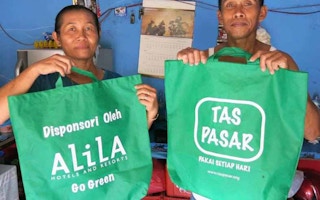A cross the globe, Bali, also referred to as the Island of the Gods, is renowned for its coastal beauty. Unfortunately, in recent years, many of the white sandy beaches that long have lured tourists from all over the world to Bali have become increasingly dirty and polluted, with piles of trash ruining the beautiful picture.
In fact, it has become so alarming that Bali is facing a crisis due to the overflow of garbage all over the island. Every day, the island produces about 10,000 cubic meters of garbage, 10 to 12 percent of which is plastic. With more than four million inhabitants, it is calculated that about eight million plastic bags are given out in Bali every day, be it at supermarkets, warung (roadside stalls) or boutiques.
This overflow of plastic trash, combined with an ineffective waste disposal system represents a serious danger for the environment. Out of the 10,000 cubic meters of garbage produced every day, only half of it is taken care of by the government. The rest is either being burned, dumped into rivers or discarded carelessly on the roadside and beaches.
The ineffective disposal of plastic waste poses serious threats. Much of the plastic waste that remains uncollected is burned, producing highly toxic smoke that can cause health problems, including cancer. The trash thrown away carelessly by the side of the roads can block sewer lines and cause flooding. And waste thrown into the sea might be ingested by sea creatures, causing death for turtles, fish and sea birds.
Aiming to tackle this problem, Tas Pasar (Market Bag) is a Bali-born social movement initiated by Australian David Eagles who has been living in Bali for 16 years, in collaboration with Balinese bodybuilding champion Komang Arnawa, and the Solemen Indonesia Foundation.
Their project revolves around the simple idea of reducing plastic trash by introducing a reusable bag.
“Thirty years ago, all Balinese women brought a basket to the market when shopping. But now nobody brings a bag. Everything, including the daily offerings, is taken home in plastic bags,” Eagles says, thus explaining the need to return to the old practice.
Tas Pasar calls for a holistic collaboration with local warungs, corporations and the tourism industry at large. Environmentally conscious business establishments in Bali can join the project with as little as a Rp 2 million ($174) donation to produce 500 reusable bags.
These bags are then distributed for free to warungs, which then have to agree to hand out the bags — free of charge — to their regular customers. The warungs will also benefit because their owners no longer have to buy plastic bags.
The average warung in Bali hands out 100 to 150 plastic bags per day to customers, costing owners approximately $40 to $50 per month. By encouraging the consumer to bring a reusable bag, and insisting on its proper implementation, the warung can make considerable savings in operating costs while keeping Bali’s environment clean and pretty.
The reusable bag is of the same size as a plastic bag. Some modifications have been made, for instance adding a short handle stitched on the top, suitable to hang on motorcycle, in the hope that it will provide extra incentives for people to carry while shopping.
Tas Pasar bags are made from spunbond nonwoven fabric, which is commonly used as an alternative to plastic.
“These are not fully environmentally friendly bags, but they are reusable,” Eagles explains.
The people behind Tas Pasar are currently thinking about issuing a bag made of 20 percent recycled material at a later date, but for now, the main focus remains on creating awareness and habit-building around reusing bags to protect the environment.
In order to make the project more widely known, Tas Pasar has also launched online and offline campaigns featuring Komang, whose two world championship titles in natural body building have made him a suitable celebrity advocate for this campaign.
Komang, a local hero to Balinese children, poses in the campaign poster with his muscles bulging, holding a bag in each hand, and says “Jangan lupa bawa tas sendiri, mari selamatkan Bali dari bahaya plastik” (“Don’t forget to bring your own bag, let’s save Bali from the hazard of plastics”).
Komang has also appeared at several campaign talks held at local schools to raise environmental awareness and the habit of using reusable bags among Bali’s younger generation.
The digital campaign can be accessed through the project’s website, taspasar.org, and on Facebook, where daily updates are provided.
To encourage people to keep using Tas Pasar, a small incentive is being put in place. Eagles explains: “The idea is to give people a small present for reusing the bags. At the moment, we give them stickers, but we’re thinking of giving them something else, like pencils, in the future.”
The project’s campaign slogan is also printed on the poster and on the bag, saying “ Tas Pasar, pakai setiap hari ” (“Tas Pasar, use it every day”) as a reminder for users to bring it for their daily shopping and show it off to the world.
Since the launch of the project in September 2012, 20,000 bags have been made and distributed to dozens of warungs across southern Bali.
Eagles says he is encouraged to keep going by the positive response of all those involved in the campaign.
“This project is still in its initial stage, but we have received much support from the sponsors and the warungs, so I’m very optimistic that zero plastic in Bali is reachable,” he says.
“We are hoping more sponsors will join this initiative.”










